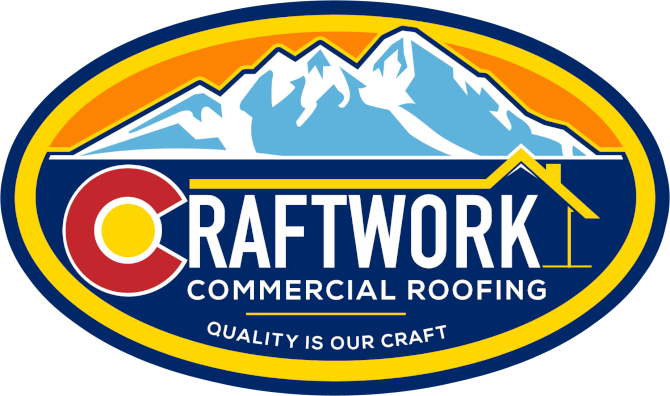Modified Bitumen
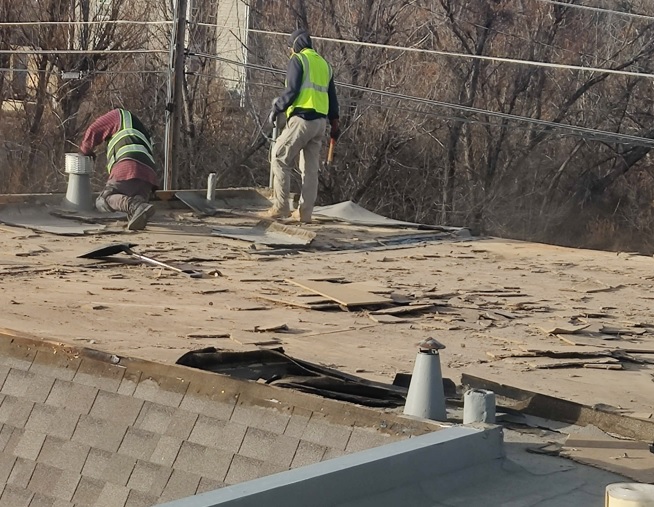
What is Modified Bitumen Roofing?
As a longtime commercial roofer here in Denver, modified bitumen has been one of my go-to roofing systems for industrial and commercial properties. This multi-ply roof assembly combines reinforcing fabrics like fiberglass or polyester with mopping layers of asphalt that has been fortified with APP or SBS polymer modifiers.
waterproof protection
This modernized bitumen provides significantly increased strength and weathering abilities compared to traditional built-up roofing. Modified bitumen delivers the rugged waterproof protection that Denver’s harsh climate demands while also being very cost-effective upfront.
low maintenance
Its low-slope design easily sheds precipitation and its redundant reinforced plies form a robust barrier against leaks. For property managers, modified bitumen is also relatively low maintenance once installed. While not quite as long-lasting as single-ply systems, a quality modified bitumen application can easily provide 15-20 years of reliable roof performance when properly maintained. This blend of affordability and durability makes modified bitumen an excellent choice for commercial and industrial facilities looking to maximize their roofing investment without breaking the bank.
Advantages of Modified Bitumen Roofing
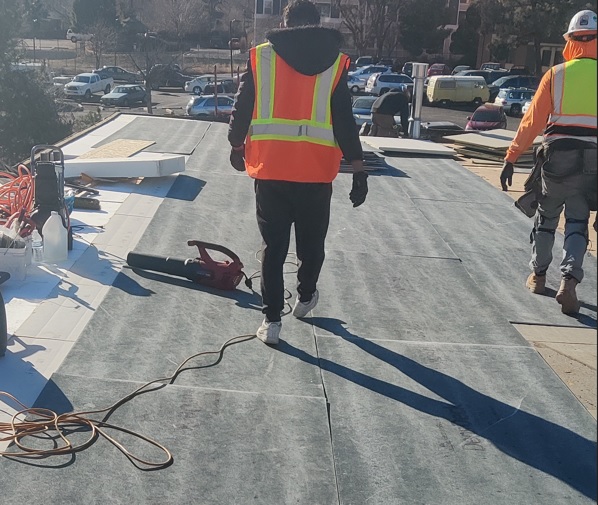
Durability and Longevity
When it comes to getting a real bang for your buck, modified bitumen roofing really shines in the durability and longevity department. This multi-ply assembly uses heavy-duty reinforced fabrics along with that fortified polymer-modified asphalt to create an incredibly rugged, weathertight membrane. The modified bitumen compound itself has superior resistance to UV radiation and thermal shock compared to traditional roof coatings and asphalt products. It doesn’t dry out, crack or become brittle over time like some other materials. The redundant reinforced plies also give modified bitumen incredible tensile strength to withstand high winds, hail impacts and heavy roof traffic without tearing or puncturing. Properly installed and maintained, a quality modified bitumen roof can easily provide 15-20 years of waterproof protection here in the harsh Denver climate. Many of my commercial clients have even gotten upwards of 25 years of service life from these roofs before requiring replacement. With its combination of durability and affordability, modified bitumen delivers exceptional long-term value.
Waterproofing
This multi-ply assembly creates an incredibly robust waterproof barrier made up of multiple reinforced layers of that fortified asphalt membrane. Unlike single-ply systems that rely on a single sheet, modified bitumen has built-in redundancy – if one layer becomes compromised, there are multiple backup plies underneath to prevent moisture infiltration. The asphalt itself cures into an impermeable, monolithic surface when properly mopped down in a multi-ply application. This seamless construction eliminates any entry points for leaks to form.
Modified bitumen also exhibits superior resistance to ponding water compared to many other flat roof systems. While prolonged standing water can potentially deteriorate other materials over time, the cured asphalt membrane is not affected. Its low absorption rate prevents moisture from migrating beneath the surface to cause future leaks or degradation from within. This resistance to ponding water is a crucial advantage that protects their operations from costly interior damage.
Cost-Effectiveness
One of the biggest selling points I emphasize to my commercial clients is the excellent cost-effectiveness that modified bitumen roofing provides over the long run. From an upfront pricing standpoint, these multi-ply systems are very competitively priced compared to other premium flat roofing options like single-ply membranes or coatings. But where modified bitumen really pays dividends is through the long-term savings it delivers in reduced maintenance and repair costs. These redundant reinforced plies are incredibly resistant to leaks, punctures and wind uplift that can plague other roof assemblies. This lessens the need for constant repairs and premature re-roofing that eats into maintenance budgets every year.
A well-installed modified bitumen application also has an expected service life of 15-20 years here in Denver before requiring full replacement. Compare that to lower-cost roofing options that might only buy you 8-10 years. When you factor in avoiding disruptive roof tear-offs and material/labor costs every decade, modified bitumen has extremely low lifecycle costs. For building owners watching their bottom line, it provides top-tier waterproof protection with maximum return on investment.
Energy Efficiency
Modified bitumen roofing can actually provide some nice energy efficiency advantages that trim utility costs. While the membrane itself starts out as a darker applied surface, its fortified asphalt compound has very good reflective properties to minimize heat absorption once it weathers to a lighter gray/tan color. This reflectivity stems from the polymer modifiers that enhance UV resistance and prevent rapid degradation from Denver’s intense high altitude sunlight. Unlike traditional asphalt that can become brittle and crack, modified bitumen maintains its integrity and heat-reflective properties for much longer service life.
When combined with proper insulation, these effective “cool roof” characteristics help reduce energy demands for air conditioning interior spaces during our hot summer months. Over the 15-20 year expected lifespan, the energy cost savings from modified bitumen’s UV resistance and reflectivity can really add up. For building owners looking to increase their energy performance without the premium pricing of specialty cool roofs, modified bitumen offers an affordable balance of durability and efficiency.
Flexibility and Strength
One of the key advantages of modified bitumen is its superior flexibility and strength. Unlike rigid roofing materials, modified bitumen membranes have the ability to expand and contract significantly with our extreme temperature swings here in Denver without cracking or rupturing. This exceptional dimensional stability stems from the polymer modifiers blended into the asphalt compound that enhance its elasticity. As temperatures fluctuate between scorching summer heat and sub-freezing winter conditions, modified bitumen can stretch and recover its shape to resist thermal shock and leaks from movement stresses that would compromise other roof systems.
At the same time, this fortified multi-ply assembly also exhibits incredible tensile strength from its heavy-duty reinforcing fabrics and redundant layers. This allows modified bitumen to withstand harsh impacts from hailstorms, dropped tools and repeated roof traffic without tearing or puncturing. The reinforced plies create a robust tear-resistant barrier for maximum protection. This powerful combination of flexibility and tear strength translates into a roofing solution that maintains its waterproof integrity decade after decade despite our punishing climate exposures.
Components and Properties of Modified Bitumen Roofing
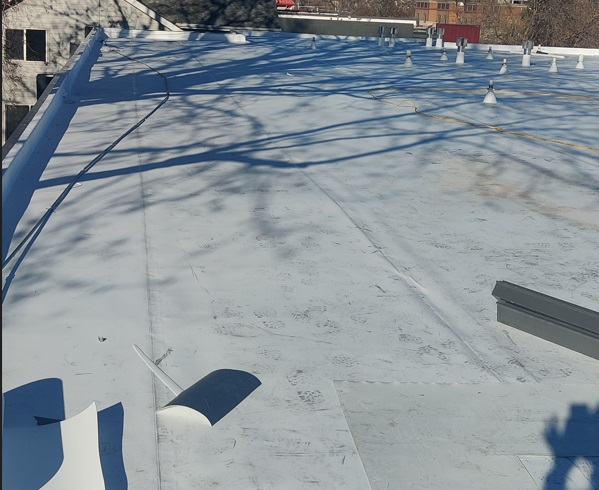
Material Composition
At its core, modified bitumen roofing starts with a quality asphalt compound that has been fortified with specialized polymer modifiers to enhance its performance abilities. There are two primary types of these modified asphalt membranes that my team works with – APP (Atactic Polypropylene) and SBS (Styrene-Butadiene-Styrene) formulations. APP modified bitumen uses a plastic polypropylene polymer that increases the asphalt’s temperature resistance and weathering capabilities. It creates a stiffer, more rigid membrane ideally suited for hotter climates. SBS on the other hand blends in synthetic rubber polymers that provide superior flexibility, elongation properties and cold temperature tolerance – making it a fantastic fit for our climate extremes here in Denver.
Beyond just the polymer modifiers, both APP and SBS bitumen incorporate reinforcing mats made of materials like fiberglass or polyester to add incredible tensile strength. This multi-ply reinforced construction prevents tears and punctures while forming a robust waterproof barrier far more durable than traditional asphalt products. This unique modified bitumen composition delivers the ideal balance of weathering resistance, flexibility and robustness to protect their rooftops for decades.
Physical Properties
The physical properties of these modified bitumen membranes are really what sets them apart and allows them to provide such exceptional long-term performance here in Denver’s harsh climate. Thanks to those polymer modifiers like SBS rubber, modified bitumen exhibits incredible flexibility and elasticity to survive our extreme freeze-thaw cycles and temperature swings without becoming brittle or cracking. The membrane can stretch and recover its shape through an incredibly wide temperature range. This dimensional stability prevents leaks from thermal movement and shock.
At the same time, modified bitumen also demonstrates superior resistance to chemicals, greases, oils and environmental pollutants compared to traditional asphalt-based roofs. The fortified asphalt compound is highly inert, creating an impermeable barrier that doesn’t allow absorption or corrosion from exposure to harsh substances. This chemical resistance helps preserve the watertight integrity of the roofing system over decades of service life. For my commercial and industrial clients dealing with chemical spillages or airborne contaminants, modified bitumen provides robust protection to avoid potential leaks, degradation and premature failures commonly seen with other roofing materials in similar conditions.
Installation Process
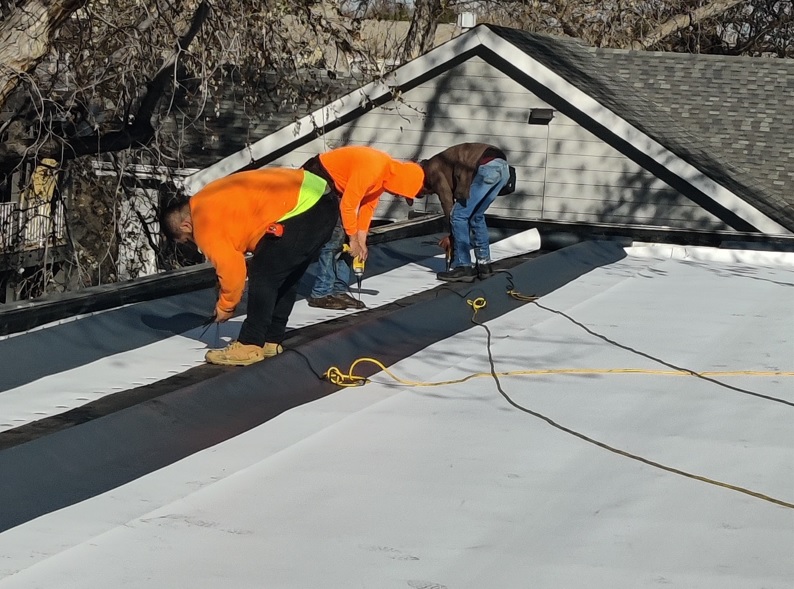
Preparation
Proper preparation of the existing roof deck is absolutely critical before my crews can install a long-lasting, effective modified bitumen roof assembly. We start with a thorough inspection to identify any potential issues or areas of concern that need to be addressed. This involves carefully examining the entire surface for deterioration, damaged areas, loose flashings or other defects. Any debris, abandoned equipment or materials that could cause future punctures get removed. We then make all necessary repairs – sealing cracks, patching blisters, re-securing flashings and replacing any wet or deteriorated insulation or decking.
Proper cleaning is also essential to remove dirt, grease, oils or other contaminants that could inhibit adhesion of the new membrane plies. Depending on the condition, this may require power washing, chemical cleaning and priming of the substrate. While this critical prep work adds some time upfront, it ensures a smooth, sound base for the modified bitumen to adhere and perform optimally over its full service life without leak issues. This comprehensive preparation is a wise investment to maximize their roofing system’s waterproofing capabilities and longevity.
Application Methods
When it comes to actually applying those fortified modified bitumen membranes, my team has three primary techniques that we employ based on the specific project scenario. For new roof installations able to accept an open-flame application, we often specify a sturdy torch-applied modified bitumen system. Using specialized roofing torches, we carefully heat and adhere each reinforced bitumen ply one at a time across the roof surface to create a seamless, fully-bonded watertight assembly. This ensures maximum resistance against wind uplift and leak issues down the road.
For re-roofing over specific substrate types like lightweight concrete or certain existing membranes, we may instead utilize a cold-applied modified bitumen assembly using specialized adhesives to bond the reinforced plies together. While more labor-intensive than torching, this method eliminates fire risks during installation. We also work with self-adhered modified bitumen membranes for some applications. These peel-and-stick sheets go down quickly without adhesives or torches but still form a redundant multi-ply system when the plies are overlapped and bind together under pressure and ambient heat. Regardless of application style, we follow strict safety protocols and manufacturer specifications to ensure a top-quality, watertight modified bitumen roof.
Timeframe
While every project is somewhat unique, I can provide a general timeframe. For a typical low-slope roof under 50,000 square feet with normal access, my experienced crews can usually get the full modified bitumen assembly installed in 1-2 weeks from start to finish. This covers prepping the existing roof surface, laying out the rigid insulation and base sheets, and then fully torching down or adhering the reinforced modified bitumen cap sheets layer by layer. Larger roof areas or more complex designs with numerous penetrations and details will naturally extend that timeline a bit.
The chosen application method is also a factor – cold-applied and self-adhered modified bitumen may require slightly more installation time than a torch-applied system. Weather can throw a wrench into even the best-planned schedule too – we can’t install when there’s excessive moisture, high winds or temperatures below 40°F. Assuming reasonable conditions though, my team is equipped to work efficiently while ensuring the highest standards of quality craftsmanship on every modified bitumen roof we install.
